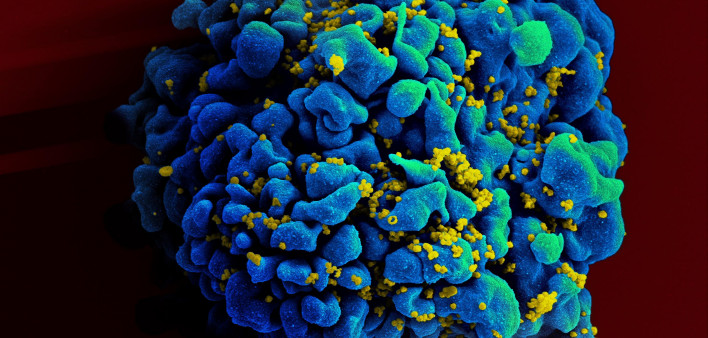Did you know that HIV itself can cause cancer? It’s true. But that doesn’t usually happen, despite how quickly the virus can invade cells and replicate itself. Now, a study published in Science may explain why.
It is well known that certain viruses, including human papillomavirus and hepatitis B and C viruses, can cause cancer. People living with HIV may develop AIDS-defining cancers, including lymphoma and Kaposi sarcoma, when the virus suppresses their immune system. Animals infected with other retroviruses often develop cancer because these viruses integrate their DNA into host genes, but this rarely happens in people with HIV.
According to data from three HIV-positive people with lymphoma, it may be a case of a series of very unfortunate events—all of which must line up perfectly in order for a cell to go from simply carrying a genetic copy of HIV, called a provirus, to the virus triggering uncontrolled cell growth.
The type of cancer that HIV could directly cause is T-cell lymphoma—a cancer of immune cells found in the blood and lymph nodes. John Mellors, MD, of the University of Pittsburgh School of Medicine, and colleagues started with 13 people with HIV and lymphoma, looking specifically at whether the cancer cells themselves had high levels of HIV provirus in them, which could indicate that it was the virus that caused the cancer.
Just three of the 13 participants fit the bill. When the researchers looked more closely at the cancer cells themselves, they paid special attention to which of the many genes that make up the T cell’s DNA the virus locked on to and used to copy itself.
What they found was that of all the possible T-cell genes, HIV bound to only two of them in these individuals: STAT3 by itself or a combination of STAT3 and another gene called LCK. In a healthy T cell, both genes are responsible for regulating cell growth. But genes that are already prone to mutation, when combined with HIV DNA, may trigger the development of cancer rather than the more typical growth of noncancerous clones.
“We seem to have explained some of the mystery of why HIV is rarely the direct cause of cancer,” Mellors said in a press release. “Our investigation showed that it requires a very unusual series of events involving changes in HIV and additional mutations in human genes in someone with HIV to develop lymphoma.”
What the researchers don’t know yet is whether reducing the number of copies of the virus in the body by starting antiretroviral treatment early could reduce the occurrence of lymphoma among people with HIV.
“As a physician, I am reassured that these events are rare,” Mellors stated. “Although we need to be aware that HIV has the potential to cause lymphomas, it’s such a rare occurrence that there is no need for heightened anxiety now. Clinicians should always screen their patents for cancer as part of routine health care, but people with HIV do not need to fear that they will inevitably develop lymphomas.”
Click here to read the full Science report.
Click here to learn more about lymphoma in people with HIV.
Click here for more news about HIV and cancer.







Comments
Comments